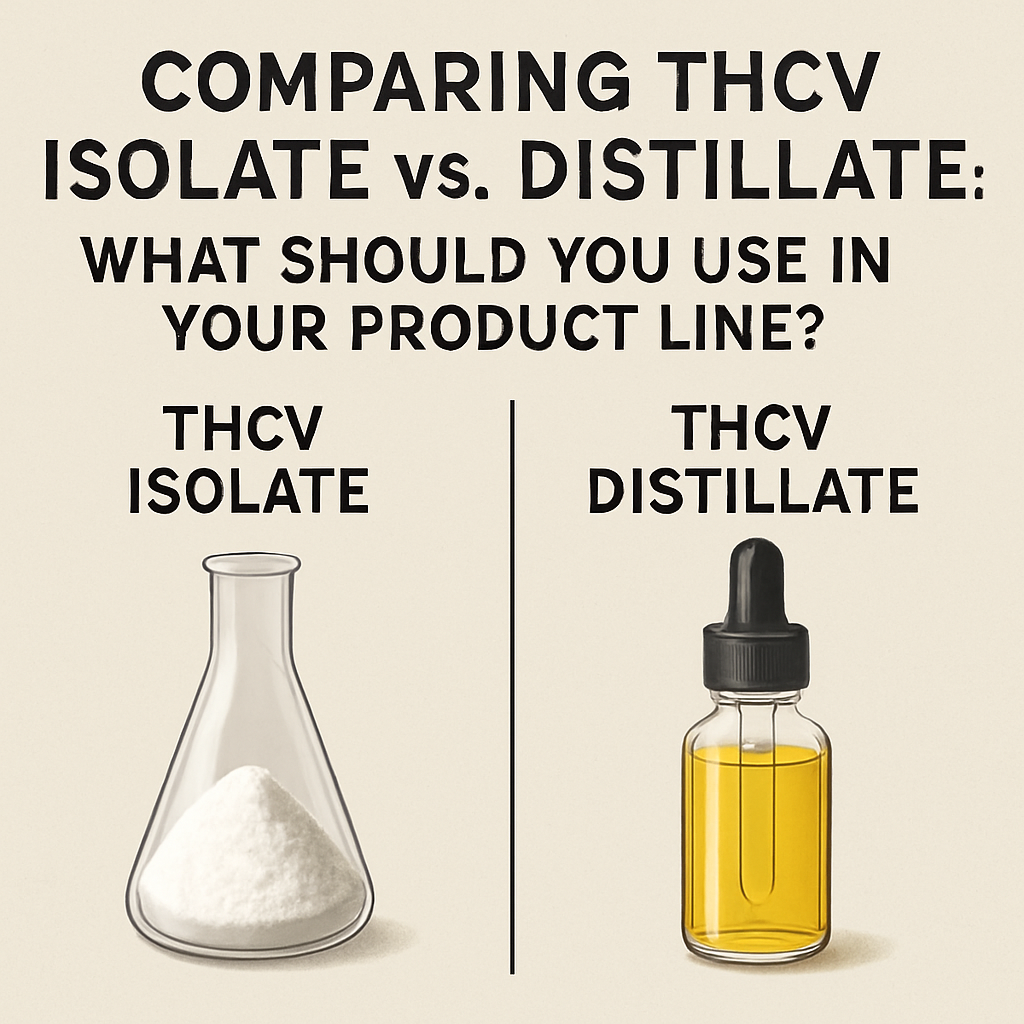As the cannabinoid industry continues to diversify, tetrahydrocannabivarin (THCV) is gaining recognition for its unique functional properties and formulation potential. With its rising popularity comes a key decision for product developers and B2B buyers: Should you use THCV Isolate or THCV Distillate in your product line?
Both forms offer distinct advantages depending on your goals, product format, and market strategy. This article compares THCV Isolate and THCV Distillate side by side, helping you choose the right fit for your formulation and business model.
🧪 THCV 101: A Quick Recap
THCV is a rare cannabinoid found in trace amounts in hemp. While it shares a similar chemical structure with THC, it exhibits different effects — often described as clear-headed, uplifting, and focus-enhancing.
Its potential benefits have drawn attention from brands in the wellness, performance, skincare, and supplement sectors. To bring these products to life, THCV is most commonly offered in two refined formats:
- THCV Isolate – a high-purity form with minimal additional compounds
- THCV Distillate – a refined oil containing THCV along with trace cannabinoids and terpenes
Let’s explore the differences.
🔍 THCV Isolate vs Distillate: Key Comparison Table
| Feature | THCV Isolate | THCV Distillate |
| Purity | 98%+ THCV | ~80–90% THCV |
| Cannabinoid Profile | Primarily THCV only | Includes trace cannabinoids and possibly terpenes |
| Color | Typically clear or light | Golden, viscous oil |
| Smell/Taste | Neutral | May have mild hemp aroma |
| Best for | Gummies, capsules, tinctures, topicals | Vapes, tinctures, balms |
| Formulation Control | High (single compound) | Moderate (entourage effect possible) |
| Compliance Flexibility | Easier to dose/test for regulatory needs | May require more testing for THC levels |
| User Experience | Clean and focused | Slightly more full-spectrum feel |
⚗️ When to Use THCV Isolate
THCV Isolate is a great choice for brands that prioritize:
- Precision dosing (e.g., 5 mg or 10 mg per serving)
- Product consistency across batches
- Minimalistic or clean-label formulations
- Broad market appeal (e.g., wellness, supplements, skincare)
It’s especially suitable for:
- Gummies and chewables
- Capsules and softgels
- Oil tinctures
- Drink powders and functional beverages
- Topical skincare (especially fragrance-free or light formulas)
🛢️ When to Use THCV Distillate
THCV Distillate may be a better fit for products that benefit from a full-spectrum experience, or when you want to leverage minor cannabinoids to enhance effects.
Use THCV Distillate when:
- You’re formulating vape cartridges or disposables
- You want a broad-spectrum tincture with a stronger presence
- You’re developing balms or muscle rubs with rich, oil-based bases
- Your brand highlights the entourage effect in product marketing
It’s also ideal for brands creating signature cannabinoid blends (e.g., THCV + CBG + CBD).
👉 Explore Bulk THCV Distillate
📋 Compliance and Labeling Considerations
- THCV Isolate makes it easier to standardize your product’s cannabinoid profile, especially for markets that require strict control over THC levels.
- THCV Distillate, while often compliant, may contain trace THC or other cannabinoids that require more careful documentation and testing.
For both, make sure to:
- Request batch-specific COAs
- Use accurate cannabinoid labeling
- Stay updated on state and international regulations
🧴 Use Case Examples
| Use Case | Recommended Format |
| Focus-enhancing gummy with precise dosing | THCV Isolate |
| Full-spectrum vape cartridge for energy | THCV Distillate |
| Clean-label capsule for metabolic support | THCV Isolate |
| Functional tincture with minor cannabinoids | THCV Distillate |
| Lightweight skincare product | THCV Isolate |
| Post-workout topical balm | THCV Distillate |
🧠 Final Thoughts: Which One Is Right for Your Brand?
There’s no one-size-fits-all answer — both THCV Isolate and THCV Distillate offer unique advantages depending on your goals.
- Choose THCV Isolate for precision, purity, and formulation flexibility
- Choose THCV Distillate for entourage effects and rich, oil-based products
Ultimately, your decision should align with:
- Product format
- Target audience
- Labeling strategy
- Regulatory requirements
- Desired user experience
By understanding the strengths of each format, you can confidently select the right THCV ingredient for your next innovation — and deliver a product that stands out in a growing cannabinoid market.
